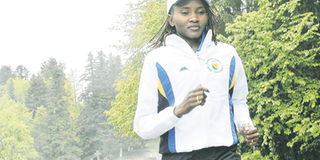Kimani eyes 3rd Olympics for Bosnia

Kenyan-born marathon runner with Bosnia and Herzegovina citizenship, Lucia Kimani, poses before training in Mrakovica, near the western Bosnian town of Prijedor, on May 15, 2016.
She started running on the plains of her native Kenya and today trains in dark Balkan forests. Now marathoner Lucia Kimani is set to become Bosnia’s first athlete to compete in three Olympic games.
PHOTO | AFP
What you need to know:
- Her unusual journey is propelled by a love story, which began in 2004. Kimani, then 23, was an unknown runner among a number of Kenyans taking part in the Salzburg marathon.
Mrakovica. She started running on the plains of her native Kenya and today trains in dark Balkan forests. Now marathoner Lucia Kimani is set to become Bosnia’s first athlete to compete in three Olympic games.
Her unusual journey is propelled by a love story, which began in 2004. Kimani, then 23, was an unknown runner among a number of Kenyans taking part in the Salzburg marathon.
The amateur footballer and hair and beauty student had completed her first marathon a year earlier, “for fun”, on the advice of a cousin. One of eight children in a poor family, she finished seventh in that debut race and won a cash prize.
“That was really motivating, so... I started training,” she tells AFP.
Also on the track in Salzburg was Sinisa Marcetic, a 19-year-old Bosnian Serb, who had been running for a decade on the steep pine-forested slopes of Mrakovica mountain, which dominates his small city of Prijedor.
Marcetic had caught the running bug after a school race in which he finished fourth. He decided he never again wanted to finish without a medal -- and he dreamt one day of training with Kenya’s world-dominating runners.
He met a group of them in Salzburg, and then came an offer to train with them early the next day.
“There was a group outside the hotel, and I saw Lucia for the first time. I fell in love,” says Marcetic.
In 2005, without a word of Serbian in her luggage, Kimani arrived in Prijedor to marry the man she now describes as her “husband and coach”.
‘They are always at war’
She says friends and family in Kenya were “kind of scared” by her decision, as they knew Bosnia only from its bitter inter-ethnic war in the early 1990s.
“They were like, Lucie, you must be crazy, how can you go to that place? They are always fighting, killing each other.”
Now in Bosnia, she faces the curiosity of children who ask her why she wears “a lot of make up”, in reference to her dark skin.
Kimani finds such comments entertaining, but adults can be less innocent, sometimes calling her racist names. Nevertheless she says she now feels settled in Bosnia.
“I was lucky because Sinisa’s family really accepted me well, I have a lovely mother-in-law... and with the help of the rest of family I guess it was not hard for me to get adapted.”
She has flourished in particular on the tracks, winning four national records from the 10,000 metres to the marathon.
At the Beijing Games she finished 42th in the marathon in two hours 35 minutes; in London, she dropped out of the race.
Despite an interruption caused by pregnancy and the birth of her daughter Victoria two and a half years ago, Kimani has passed the threshold for this year’s games in Rio de Janeiro.
When she runs for Bosnia, “I feel like I run for my country,” she says.
Money cannot be her driving force to run in the former Yugoslav republic, one of Europe’s poorest nations, where athletics is a minority sport.
To make a living, “I need to run much faster,” Kimani says. Just buying two pairs of running shoes every two months is a sacrifice.
Running school
Kimani’s interval training sessions often take place on old and uneven steps through the pines to the peak of Mrakovica, the site of a huge concrete monument to a battle between Tito’s Partisan resistance movement and the Nazis.
It is an austere setting, often hidden by mist, where she is sometimes accompanied by young athletes belonging to the Lucia Kimani Running School that she cofounded with Marcetic.
They take care of 40 children from Bosnia’s various ethnicities -- a mix of Croats, Serbs and Muslims.
“Even with the small money that we have, with the small infrastructure that we have, you still can work hard and make something,” says Kimani.
She is picking up the local language, although she still struggles with the difficult declensions, and she now considers herself fully Bosnian.
Whatever other people think, “I know for myself,” she insists.
Her husband listens silently. She has taken him several times to her Kenyan hometown of Kiserian, near Nairobi.
“Over there everyone runs,” Marcetic says, looking at his wife. “It’s very beautiful.” (AFP)




